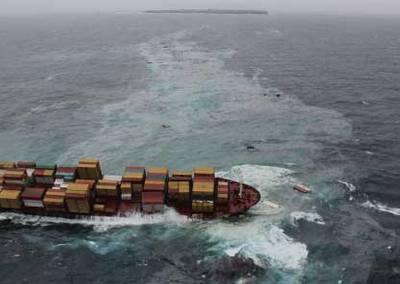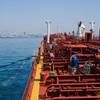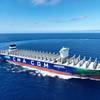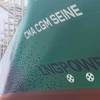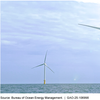Rena Grounding Response Reviewed
Maritime New Zealand (MNZ) welcomed the release of the independent review of its response to the grounding of the Rena, and the announcement of $2 million of government funding to help improve New Zealand’s maritime response capability.
The report, by independent reviewer Simon Murdoch, was released today by Transport Minister Gerry Brownlee.
MNZ Director Keith Manch said the organization was already implementing a number of the review recommendations and the funding package would help MNZ develop a wider strategic and operational response to maritime incidents.
In the review report, Murdoch made it clear the Rena grounding was unprecedented in its complexity but the response, while flawed in some aspects, had ultimately been effective.
After Rena hit the Astrolabe Reef on October 5, 2011, hundreds of oil spill responders and 8,000 volunteers removed around 1,000 metric tons of oily waste from the coastline, recovered more than 4,500 metric tons of containers and debris and rescued hundreds of oiled birds. Beaches closed as a result of oil were re-opened from November 16, 2011.
“The reviewer finds the response team overcame initial hurdles to set up a strong and effective team that worked closely with the local community. The response minimized the risks to wildlife and achieved a high quality, world class clean-up,” Manch said. “The generally positive results of the Rena Recovery Plan’s scientific monitoring program support this finding.”
Manch said the response team faced a complex scenario involving not only oil recovery, but non-oil pollution from containers and resulting debris, as well as overseeing a difficult salvage operation.
“I’m very proud of the professional and sustained effort by people across MNZ but we certainly did not act alone. The success of the response was only possible due to the collaborative efforts of the Bay of Plenty Regional Council, iwi, community groups, local government and other agencies such as the Department of Conservation, the Defense Force, and Massey University’s Wildlife Health Center.”
The review states: “As is often the case, imperfections in systems, plans and structures, which are to be expected in any crisis, can be overcome by a workforce that is motivated and well managed.”
“The review identifies a range of areas for improvement including: being better prepared (strategically and operationally) across government and with response partners; having greater capability and training; improved administration; revising the structure of the incident command center (ICC); and better engagement with communities and iwi.”
Manch said a work program was already underway to build on the lessons identified in the review. MNZ has:
- worked closely with the Ministry of Transport, Department of Prime Minister and Cabinet, and the Environmental Protection Agency to improve inter-agency information-sharing and reporting on maritime response activity.
- undertaken a comprehensive review of the National Response Team (NRT) – a group of trained oil spill responders from around the country who form the core response team for a Tier 3 oil spill incident. The team will have greater resources to support oil spill response and the national oiled wildlife response.
- appointed an exercise leader and additional technical support staff at MNZ’s Maritime Pollution Response Service (MPRS). A logistics manager has also been seconded to MPRS to improve national procurement and supply arrangements.
- reviewed its international support arrangements for oil spill response – both government and specialist commercial support. This includes the Australian Maritime Safety Authority (AMSA) and salvage experts London Offshore Consulting.
- developed additional specialist support arrangements in areas such as well control and hazardous and noxious substances
- initiated discussions with the Department of Conservation aimed at the development of memorandum of understanding to develop a wider response policy framework to address non-oil pollution and natural resource protection in its marine jurisdiction and coastline.
- reviewed the wildlife response contract to ensure better integration of this area of the response into the NRT.
- undertaken training for MNZ staff on the International Oil Pollution Compensation Fund and International Tanker Owners Pollution Federation to improve understanding of how financial claims for oil pollution incidents should be compiled.
- MNZ is currently reviewing the national Oil Spill Response Strategy.
- MNZ is also reviewing its purchasing system to improve financial management during the peak of a response.



